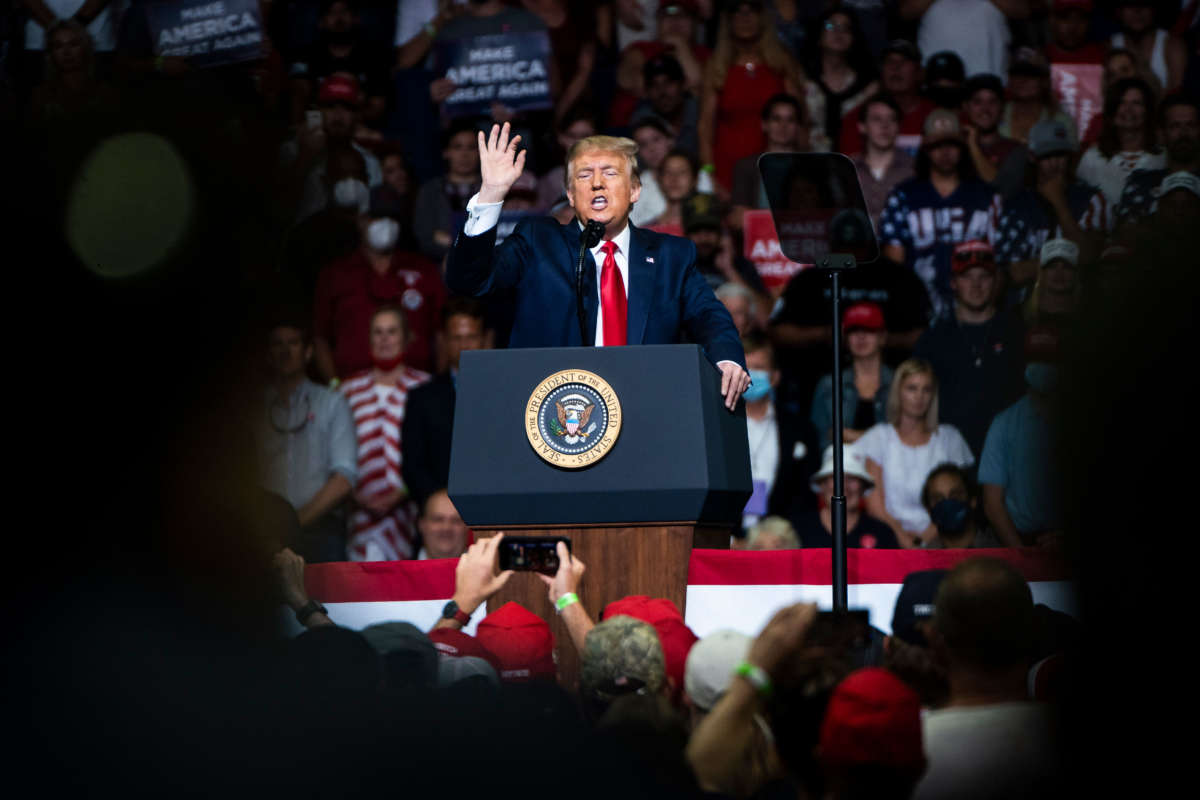Honest, paywall-free news is rare. Please support our boldly independent journalism with a donation of any size.
A public health official in Tulsa, Oklahoma, suggested this week that President Donald Trump’s campaign rally in the city last month likely caused a spike in new cases of coronavirus seen in the jurisdiction.
Trump held a campaign rally indoors at the BOK Center in Tulsa on June 20. Bruce Dart, the director of the Tulsa City-Council Health Department, explained on Wednesday that large events like Trump’s rally likely resulted in the spread of COVID-19 in the city and county since that time.
While the health department does not identify specific events or individual settings where people contracted the virus, speaking broadly, Dart said that large gatherings in recent weeks (which would include the Trump rally) “more than likely” contributed to an increase in numbers.
“In the past few days, we’ve seen almost 500 new cases, and we had several large events just over two weeks ago, so I guess we just connect the dots,” Dart explained.
On the Monday and Tuesday before Trump’s campaign rally in Tulsa took place, Tulsa County saw 172 new cases of coronavirus reported. Conversely, this week’s totals from Monday and Tuesday saw a total of 467 new cases.
Before Trump hosted his event, Dart had warned about him coming to the city, arguing it was a bad idea due to the potential harm it could cause with regard to the disease.
“I think it’s an honor for Tulsa to have a sitting president want to come and visit our community, but not during a pandemic,” Dart said the week before Trump came to Tulsa. “I’m concerned about our ability to protect anyone who attends a large, indoor event, and I’m also concerned about our ability to ensure the president stays safe as well.”
The suggestion that Tulsa’s coronavirus numbers increased because of large events in the area recently, including Trump’s rally, comes as the president’s reelection campaign is set to hold another event, this time in Portsmouth, New Hampshire, this weekend. While this event is set to take place outdoors at the Portsmouth International Airport, many have called on Republican Gov. Chris Sununu to issue an order requiring masks or facial coverings for gatherings that feature 50 people or more.
Sununu, however, has declined to issue such an order. However, while he does intend to greet Trump at the airport, Sununu himself is not planning to attend the rally.
“I’m going to meet the president as the governor, I will not be in the crowd of thousands of people,” the governor said.
Ahead of the event, the Trump campaign announced “there will be ample access to hand sanitizer and all attendees will be provided a face mask that they are strongly encouraged to wear,” but such masks will not be required of those who are at the event.
New Hampshire Democratic Party chair Ray Buckley decried the president’s decision to come to the state in the middle of a pandemic.
“Trump’s response to the COVID-19 crisis has been chaotic and woefully inadequate, resulting in thousands of Granite Staters contracting the virus and hundreds of lives lost, while causing significant damage to our state’s economy,” Buckley said after the announcement of Trump’s campaign stop. “Instead of helping our state safely recover, Trump is flying in for a political rally that will only further highlight the chaos he has caused.”
While polling has indicated that most of Trump’s own supporters would support requirements to wear a mask or facial covering, they are the political group that is least likely to do so.
According to a Farleigh Dickinson University poll conducted last month, 63 percent of those who call themselves Trump supporters said they’d be fine with mask requirements. Meanwhile, 95 percent of those who say they are critics of Trump said they’d be supportive of a mask mandate.
Media that fights fascism
Truthout is funded almost entirely by readers — that’s why we can speak truth to power and cut against the mainstream narrative. But independent journalists at Truthout face mounting political repression under Trump.
We rely on your support to survive McCarthyist censorship. Please make a tax-deductible one-time or monthly donation.
